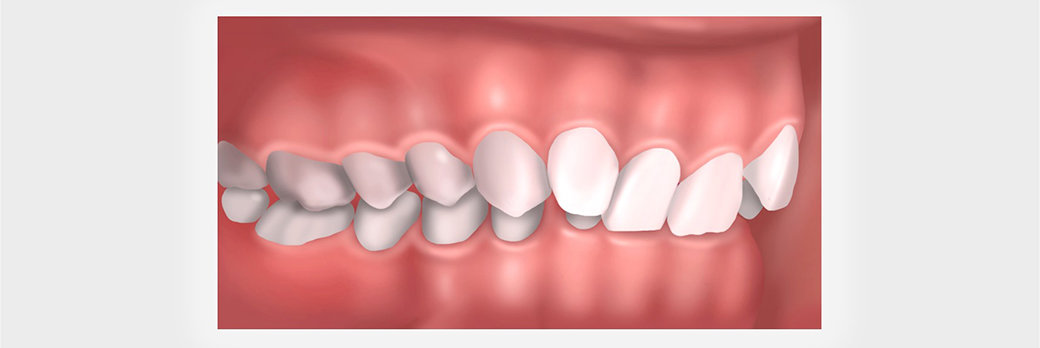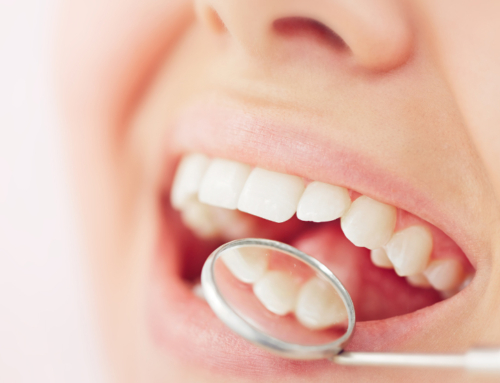What is a Deep Bite and How is it Treated?

A deep bite, also known as increased overbite, is the most common malocclusion found in both children and adults. While many may consider a deep bite nothing more than a cosmetic factor affecting a smile, a deep bite is much more than that, and, if left untreated, can result in many different dental, jaw, and facial complications. Deep bites are treated with a variety of different orthodontic options, depending on the severity of the bite.
What is a Deep Bite?

A deep bite occurs when there is an abnormal vertical overlap between the upper and lower teeth. A normal overbite is about 3mm and anything over that is considered a deep bite, typically between 4mm and 10mm. In some cases, the bite may be so deep that the top teeth will completely hide the bottom teeth. It is common for the bottom teeth to erupt in a bell-shaped pattern, with the lower teeth actually hitting the roof of the mouth when you bite down. A deep bite can affect chewing, speaking, and even breathing comfortably. A deep bite will affect the shape of a person’s face, making it short and rounded, as well as often giving an older appearance.
What Can Cause a Deep Bite?
In most cases, an increased overbite is a hereditary condition affecting the jaw and teeth formation. This can include things such as too much space in the jaw area or teeth too large for the jaw. It can also be caused by incorrect jaw formation during development, thumb-sucking, and extended bottle-feeding and pacifier use in children. Things like nail-biting and chewing on pencils can also contribute to a deep bite.
How Do I know if I Have a Deep Bite?

Regular dental visits, starting in childhood, allow your dentist to identify a deep bite early and refer you to an orthodontist for treatment. Deep bites can also cause symptoms that might point you to a problem even if you haven’t been to the dentist. Regular jaw pain, headaches, grinding of teeth, tooth sensitivity, problems with chewing and swallowing, and unclear speech can all be signs of a possible deep bite. IF you experience any of these issues on a regular basis, see your dentist for an evaluation.
Why Does a Deep Bite Require Treatment?
While a deep bite can contribute to overlapping or misaligned teeth that can affect your smile, a deep bite is not just a cosmetic issue. The misalignment of the jaw and teeth can lead to a variety of health complications. Excess wear on the teeth and gums can lead to tooth loss and gum disease. If your lower teeth are biting into the roof of the mouth, this can lead to sores and ulcers. The misalignment can lead to jaw pain, headaches, and temporomandibular joint disorders (TMD). Chewing and eating may be difficult, contributing to poor nutrition. You may experience difficulty opening or closing your mouth completely. An increased overbite can also affect speech, as you work your jaw and tongue around the abnormal alignment, you may notice a slur in words. A deep bite can also contribute to sleep apnea.
Treatment Options for a Deep Bite

While deep bite treatments can occur at any age, it is much easier to treat an increased overbite in children as they are still growing and developing. Early treatment reduces the risk of damage to teeth and enamel and the longer a deep bite goes untreated, the worse it can become.
When it comes to treating a deep bite, treatment focuses on tooth placement as well as jaw alignment. In most cases, this requires multiple different treatments. Often, a first treatment option includes a bite opening plate or a bite turbo which encourages the growth of back teeth to help improve a deep bite. Orthodontic treatments, such as braces, help to realign teeth and intrude front teeth back into the jaw bone. While mild cases can use aligners, such as Invisalign, most cases require traditional braces as a large amount of force is often necessary to correct the poor angulation. If a small or under-developed lower jaw is contributing to the deep bite, a Herbst appliance may be used to promote forward growth of the lower jaw. In adults with untreated deep bites, orthognathic surgery for jaw problems and/or tooth removal might be necessary.
In many cases, a deep bite can cause damage to the surface of the teeth, even when found early. This can often require composite bonding, porcelain veneers or crowns.

While you may think of orthodontics as a cosmetic specialty designed to improve smiles, in most cases, an improved smile is simply a bonus experienced when a serious condition is corrected. A deep bite is one of those times where orthodontic care is a medical necessity and can make a true difference in your quality of life.
Have You Ever Had an Orthodontic Treatment as a Child or an Adult? How was your experience? Comment Below!






Good to know!
I think I have a mild form of this
I thought it was interesting that a deep bite is a condition that is generally hereditary. My wife’s side of the family has some history of having underbites. We should probably take our son to the dentist to make sure his teeth stay aligned.
why most of the ortho dont take this issue seriously? Feedback i got from most of them was that its is common in adults. Do not required braces to relign.
Now I understand better my treatment. I’m a 37 women, with deep bite I started my treatment one year now. After pulling my upper teeth forward, my doctor put a bite plate. He is also making space for pulling down a permanent tooth (still have one baby tooth). Eventually, I’m getting a jaw surgery to mover forward my lower jaw. It seems my case is not that easy, but I’m excited to see how it will turn out.